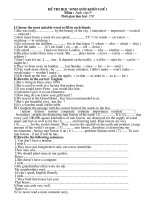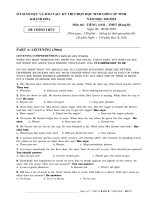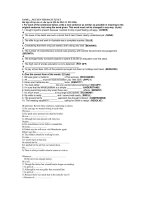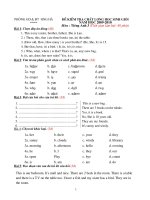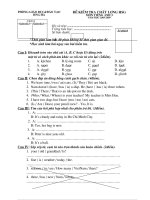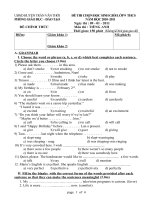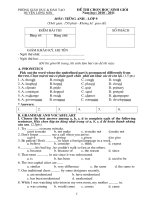- Trang chủ >>
- THPT Quốc Gia >>
- Ngữ Văn
De thi HSG mon Tieng Anh vong Tinh 20102011
Bạn đang xem bản rút gọn của tài liệu. Xem và tải ngay bản đầy đủ của tài liệu tại đây (127.67 KB, 9 trang )
<span class='text_page_counter'>(1)</span><div class='page_container' data-page=1>
<b>SỞ GIÁO DỤC-ĐÀO TẠO TÂY NINH</b>
<b> ________</b>
<b>KÌ THI CHỌN HỌC SINH GIỎI LỚP 9 THCS VÒNG TỈNH</b>
<b>NĂM HỌC 2010– 2011</b>
<b>Ngày thi : 24 tháng 3 năm 2011</b>
<b>Môn thi : TIẾNG ANH</b>
<b>Thời gian : 150 phút ( không kể thời gian giao đề )</b>
- <b>Giám khảo :</b>
- <b>Giám khảo :</b>
<b>__________________________________________________________________________</b>
( Đề thi có 7 trang , thí sinh làm bài vào đề này )
<b>ĐỀ</b>
<b>I.LISTENING ( 2P ) . You will hear each part twice.</b>
<b>Part 1 : Listen and choose a, b, or c that best completes the sentence. </b>
1. Hoi An is located ____ kilometres south of Da Nang.
a. 13 b. 30 c. 16
2. Hoi An used to be an important trading centre ____ .
a. in Southeast Asia
b. in the 19th<sub> century</sub>
c. in the Far East
3. Hoi An is well known for its old houses which are ___ .
a. small and thatch roofed
b. narrow and carved
c. small and tile roofed
4. The Japanese Covered Bridge was built _____ .
a. in the 16th<sub> century </sub> <sub>b. in the 18</sub>th<sub> century</sub> <sub>c. in 1855</sub>
5. Tan Ky House was built as a _____ .
a. house for a Chinese merchant
b. meeting hall for the Cantonese Chinese
c. house for as a Vietnamese merchant.
<b>Part 2 : Listen again and answer the questions . </b>
1. Where is the ancient town of Hoi An situated?
- ………
2. What was Hoi An as between the 16th<sub> and 17</sub>th<sub> centuries?</sub>
- ………
3. What is it now famous for?
- ………...
Điểm số:
</div>
<span class='text_page_counter'>(2)</span><div class='page_container' data-page=2>
4. When was Tan Ky House built?
- ….……….
5. When was Hoi An recognized as a World Cultural Heritage Site?
- ………..
<b>II. READING &LEXICO –GRAMMAR (12P)</b>
<b>Part 1: Read the passages carefully and then circle the best answer ( a,b,c or d )</b>
<b> A.</b>
Most large cities now have underground system, like the French ‘Metro’. When you
need to change trains, you usually ought to walk along bare, uninteresting corridors.
Sometimes, if you are lucky, there will be ‘buskers’ – people playing music in the hope of
earning a few pence. They will be very pleased if you throw a few coins into the hat they
have placed on the ground in front of them, but they will go on playing happily even if you
don’t. These buskers give us a moment of pleasure as we wait for our trains. It is a pity, then,
that the authorities are against busking, and do what they can to stop it. Buskers may be
breaking the law, but I think that most people are glad to have a little music to brighten their
busy lives.
<i><b> Questions:</b></i>
1. The writer of the passage wants to _____ ?
a. complain about the metro system
b. encourage people to use the metro
c. feel pity for buskers
d. say that busking is doing no harm
2. According to the writer, waiting for trains is most the time _____ .
a. boring b. exciting c. costing d. embarrassing
3. Buskers are those who _____ .
a. earn money selling train tickets
b. play music for fun
c. play music for a living
d. beg people for food
4. According to the passage, busking is _____ .
a. a kind of music
b. against the law
c. a kind of hobby
d. not what train passengers like
5. The word “bare” in line 2 is nearest in meaning to _____ .
a. crowded b. comfortable c. old d. empty
<b>B.</b>
One mystery about elephants that seems to have been solved is how elephants
communicate with each other. Humans have heard a whole variety of sounds coming from
elephants, but these sounds are not the only way that elephants communicate.
A new explanation about elephant communication is being proposed. Elephants vibrate
the air in their trunks and foreheads. The sound that is created during this vibration has an
extremely low pitch; the pitch, in fact, is so low that humans cannot hear it. However, it
seems that other elephants can and do hear and understand these rumblings.
<i><b> Questions:</b></i>
</div>
<span class='text_page_counter'>(3)</span><div class='page_container' data-page=3>
a. how elephants vibrate the air in their trunk
b. the answer to a question about how elephants communicate
c. communication between animals and humans
d. the sounds that elephants make
2. According to the passage, people _______ .….
a. cannot hear many elephant sounds
b. are not interested in elephant sounds
c. hear only one elephant sound
d. can hear numerous elephant sounds
3. It can be inferred from the passage that the elephant sounds that humans hear are ___.
a. one of the ways that elephants communicate
b. not part of elephant communication
c. how elephants communicate with humans
d. the only sounds that elephants make
4. Which of the following is NOT true about the extremely low sound created by
elephants?
a. Humans can’t understand it
b. Humans hear it
c. Elephants hear it
d. Elephants understand it
5. The word “rumblings” in the passage means _____ .
a. actions b. gestures c. vibrations d. trunks
<b>Part 2: Choose the most suitable heading from the list A -H. ( 1,5P)</b>
A. When the problem disappears.
B. Teacher – watch for the sign!
C. How the habit is broken
D. Our children are in danger
E. How affected children act
F. Parents on the lookout.
G. The type of child
H. The extent of the problem
1. …………..
Many of Britain’s children are becoming computer addicts, according to leading
education specialists. Such children then lose interest in anything else and become
withdrawn and introverted.
2. …………
Up to one in youngsters-over half a million- are affected. The problem usually starts
between the ages of nine and eleven and most often affects boys, who tend to get more
involved with machines than girl. They spend up to 40 hours a week tapping away.
3. ……..
</div>
<span class='text_page_counter'>(4)</span><div class='page_container' data-page=4>
often fail school tests and lose friends. But they do not care. The computer has become their
best- and sometimes their - only friend.
4. ………
Most children who have this kind of nervous complaint are not doing as well at school
as they could. Now teachers are being asked to look for the more obvious patterns of
behaviour. The National Union of Teacher has already warned its staff to identify pupils who
become restless and agitated.
5. ……..
Tony Miller, one of the teachers’ union spokesmen, says parents should limit the
amount of time their children spend at the machines. He adds: “Very young children take to
computers like fish to water. It seems to be like the problem of obsessive TV watching”. One
parent was woken at 5 am by a strange bleeping noise. She later discovered it was her addict
son at his computer.
6. ………..
Mrs Janis Norton claims a high success rate with her unique system which involves
teaching the parents as well as the child. It is a similar problem to gambling or drug
addiction. She says: “With the parents, we examine all the issues that come up in a child’s
day – food, bedtime, co-operation, homework, the tone of voice children use when talking to
their parents. We teach parents how to be in charge of the situation, how to be positive, firm
and consistent. We give the child extra lessons in whatever subjects they’re weak in. By
slowly getting the children off the machines, and replacing computers with other activities
and more confidence, the habit is broken”
<i>Your answers:</i>
1. ______ 2. ______ 3. ________ 4. _________ 5. ________ 6. _______
<b>Part 3: Fill in each blank with a suitable word .(2P)</b>
The Internet has rapidly (1)____ and become a part of our daily life. It is a very fast
and (2)_____ way to get information. People use the Internet for such a lot of (3)____ as
education, communication, entertainment and commerce. The Internet helps people (4)____
with their friends and relatives by means of (5)____ or chatting
However, the Internet also has some (6)_____. It is not only time consuming and
costly but also (7)____ because of viruses and bad programs. Moreover, the Internet users
sometimes (8) _____ to suffer various risks such (9)____ spam or electronic junk mail and
personal information leaking. (10)____, while enjoying surfing, be alert!
<i>Your answers:</i>
1. __________ 2. __________ 3. ___________ 4. ____________ 5. __________
6. __________ 7. __________ 8. ___________ 9. ____________ 10.__________
<b>Part 4 : Write the correct form of each bracketed word in numbered spaces . (2P)</b>
. The history of fishing
</div>
<span class='text_page_counter'>(5)</span><div class='page_container' data-page=5>
such as drying and salting made it possible for (3.fish) ___ to go on fishing trips further
away
.
In fact, although Europeans were completely (4.aware) ____of America’s (5.exist)___, they were already fishing near its coasts then. They were, however, still (6.able) ____ to
keep fish for any (7.long) ___of time. All this changed as a result of the new (8
.
technology)___ advances refrigeration in the 19th<sub>century. Soon the (9.coast) ___waters of Africa and the</sub>
Mediterranean were full of Northern European fishing boats. In the 20th<sub> century, scientific</sub>
(10.discovery) _____ made during the Second World War were used for discovering large
groups of fish.
<i>Your answers</i>:
1. ____________ 2. ____________ 3. ___________ 4. ____________ 5. _________
6. ____________ 7. ____________ 8.___________ 9. ____________ 10. _________
<b>Part 5 : Choose the correct alternative in each of the following sentences. (3.5P)</b>
1. “Have a nice weekend, won’t you? “ .
- “ _____ “.
a. Yes, I have b. Well, I hope to
c. Thanks. Same to you d. I hope that
2. They will have built this road ____ the end of the year.
a. after b. since c. until d. by
3. The old fisherman ____ and cast his net more than four times a day.
a. used to go fishing b. got used to go to fish
c. used to going fishing d. was used to go fishing
4. It was twenty years ago ___ my aunt returned from America. .
a. since b. that c. when d. which
5. The night club was _____ of tourists from all over the world.
a. complete b. filled c. crowded d. full
6. ____ with the painting you started last week?
a. Do you finish b. Did you finish
c. Have you finished d. Had you finished
7. “Excuse me, but there is something about ___ immediately?”
- “ Certainly!”
a. which I must speak to you b. that I must speak to you
c. which I must speak it to you d. that I must speak you
8. Nga congratulated me _____ passing my exams.
a. in b. on c. of d. about
9. “She has cooked for dinner for two hours.” means ___ .
a. Cooking for dinner took her two hours
b. She didn’t start cooking for dinner for two hours
c. She has two hours to cook for dinner
d. She started cooking for dinner two hours ago
10. The fire ____ out while everyone _____.
a. was breaking / slept b. broke / slept
c. was breaking / was sleeping d. broke / was sleeping
11. He remembers ____ to the zoo once a month when he was young.
</div>
<span class='text_page_counter'>(6)</span><div class='page_container' data-page=6>
a. let we b. don’t we c. shall we d. will we
13. The next bus _____ at 4 pm.
a. arrives b. is arriving c. will arrive d. should arrive
14. ____ you are out in the sun, you should wear a hat.
a. Whoever b. Whenever c. However d. Whatever
15. We each ____ a different point of view.
a. means b. meant c. has d. have
16. My friend stopped her motorbike ___ a newspaper.
a. to buy b. buy c. buying d. bought
17. I don’t want much sugar in my coffee. Just ____ , please.
a. few b. little c. a little d. a few
18. I‘ve no idea where we are. I wish we ____ a map
a. have b. had c. had had are having
<b>III. WRITING (6P)</b>
<b>Part 1 : Rewrite the sentences, using the words in brackets so that the new ones </b>
<b>mean exactly the same as the sentences provided.</b>
<b> Example: Could you please go to desk No 15 ? (Way)</b>
- Could you please ………… to desk No 15.
The gap can be filled by the words “make your way” , so you write:
- Could you please <i>make your way</i> to desk No15.
<b>1.</b> Why don’t you telephone me later to discuss this? ( give)
- Why don’t………...
<b>2.</b> I last heard this song ten years ago. ( since)
- It ………. .
<b>3.</b> Please don’t stop your work. ( carry )
- Please ……….……… .
<b>4.</b> The person who encouraged me the most at school was my English teacher.
(encouragement)
<b> - The person ………..</b>
<b>5.</b> “Mai, could you write up the report immediately? “ Nam said. ( want)
- Nam told Mai………
<b>6.</b> The play was so boring that we left in the interval. ( so)
- We were .………..
<b>7.</b> They left early because they didn’t want to get caught in the traffic. (avoid)
- They left early in order ……….
<b>8.</b> Although I warned them not to climb that tree, they did. (in spite)
- In ……….
<b>9.</b> Thanks for reminding me about this meeting-otherwise I would have missed it. (if)
- If ……..………
10. My sister said to me “ What about going to see our grandfather on Sunday ? “
(suggest)
</div>
<span class='text_page_counter'>(7)</span><div class='page_container' data-page=7>
1. I / feel / very happy / get / letter / after / such / long time .
- ………..
2. It / be / absolutely / ages / since / I / hear / you .
- ………
3. You / like / come / stay / me / countryside ?
- ………...
4. You / be / very welcome / if / want / visit .
- ……….
5. What about / come / end / next month ?
-………
6. My sister / miss / and / talk / you .
- ……….
7. Write / soon / let / know / when / you / come
- ………
Fondly,
Nga
</div>
<span class='text_page_counter'>(8)</span><div class='page_container' data-page=8>
<b>SỞ GIÁO DỤC-ĐÀO TẠO TÂY NINH</b>
<b> ________</b>
<b>KÌ THI CHỌN HỌC SINH GIỎI LỚP 9 THCS VÒNG TỈNH</b>
<b>NĂM HỌC 2010 – 2011</b>
<b> </b> <b>Ngày thi : 24 tháng 3 năm 2011</b>
<b>HƯỚNG DẪN CHẤM MÔN : TIẾNG ANH</b>
<b>I.LISTENING . ( 2P )</b>
<b>Part 1 : Mỗi câu đúng được 0.2 điểm.</b>
1. b 2.a 3.c 4.a 5.c
<b>Part 2 : Mỗi câu trả lời đúng được 0.2 đ</b>
1. on Thu Bon River , 30 km of Da Nang.
2. a major trading centre in Southeast Asia.
3. its old temples, pagodas, small tile roofed houses .
4. nearly two centuries.
5. in 1999
<b>II. READING & LEXICO -GRAMMAR . ( 12P) </b>
<b>Part 1 : A- Mỗi câu chọn đúng được 0.3 đ</b>
1.d 2.a 3.c 4.b 5.d
<b> B- Mỗi câu chọn đúng được 0.3 đ</b>
1.b 2.d 3.a 4.b 5.c
<b>Part 2 : Mỗi câu chọn đúng được 0.25 đ</b>
1. D 2.H 3.E 4.B 5.F 6.C
<b>Part 3 : Mỗi từ viết đúng được 0.2 đ</b>
1. developed 2.convenient 3.purposes 4. communicate 5. email
6. limitations 7.dangerous 8..have 9. as 10. So
<b>Part 4 : Mỗi từ đúng được 0,2 đ</b>
1. commercial 2. impossible 3. fishermen 4. unaware 5. existence
6. unable 7. length 8. technological 9. coastal 10. discoveries
<b>Part 5 : Mỗi câu chọn đúng được 0.2 đ . Riêng câu 13 và 14 , mỗi câu 0.15đ</b>
1.c 2.d 3.a 4.b 5.d 6.c 7.a 8.b 9.d 10.d
11.a 12.c 13.a 14.b 15.d 16.a 17.c 18.b
<b>III. WRITING (6P)</b>
<b>Part 1 : Mỗi câu đúng được 0.25 đ .</b>
</div>
<span class='text_page_counter'>(9)</span><div class='page_container' data-page=9>
4. The person who gave me the most encouragement at school was my English
teacher.
5. Nam told Mai that he wanted her to write up the report immediately.
6. We were so bored by the play that we left in the interval.
7. They left early in order to avoid getting caught in the traffic .
8. In spite of my warning they climbed that tree.
9. If you hadn’t reminded me about this meeting, I would have missed it.
10. My sister suggested us going to see our grandfather on Sunday.
<b>Part 3 : Mỗi câu đúng được 0.5 đ .</b>
Dear Mai,
1. I felt very happy to get your letter after such a long time.
2. It is absolutely ages since I heard from you.
3 Would you like to come and stay with me in the countryside?
4. You are very welcome if you want to visit me.
5. What about coming at the end of next month?
6. My sister misses you very much and often talks about you.
7. Write soon and let me know when you can come.
Fondly,
Nga
<i><b>Chú ý : Giám khảo chỉ làm tròn số đến 0.25 đ . Ví dụ :</b></i>
7.1 → 7.0 7.6 → 7.5
7.2 → 7.25 7.7 → 7.75
7.3 → 7.25 7.8 → 7.75
7.4 → 7.5 7.9 → 8.0
</div>
<!--links-->
